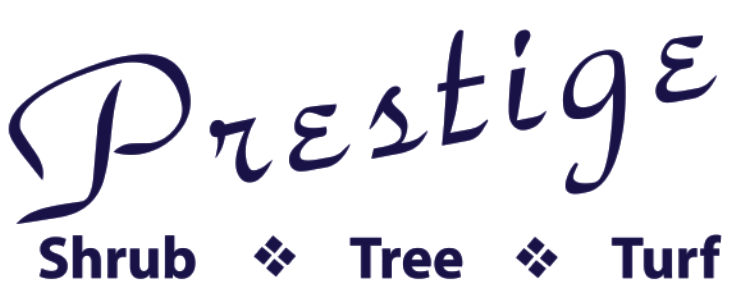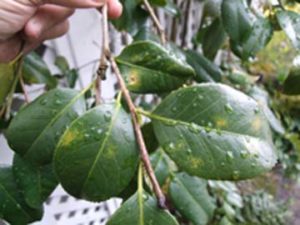 All pests tend to increase their populations when we are in drought conditions. Sucking insects can especially be troublesome. Control is not just as simple as spraying for the pests. Once these populations increase during drought years, coupled with the mild, dry winters we have been experiencing, it takes quite a while to bring these pests under control again. Even after a relatively colder, wetter winter and especially if your neighbors don’t treat their infested plants (allowing the insects to fly back to your property) the populations can stay high. Weather, poor plant health, caused by improper planting or incorrect plant selection, or wet soil conditions, allow the pests to get the upper hand and our treatments can only suppress the problem. With improving seasonal weather, choosing plants better suited for our growing conditions and properly planting the plants, many of our pest problems are not only manageable but may never develop.
All pests tend to increase their populations when we are in drought conditions. Sucking insects can especially be troublesome. Control is not just as simple as spraying for the pests. Once these populations increase during drought years, coupled with the mild, dry winters we have been experiencing, it takes quite a while to bring these pests under control again. Even after a relatively colder, wetter winter and especially if your neighbors don’t treat their infested plants (allowing the insects to fly back to your property) the populations can stay high. Weather, poor plant health, caused by improper planting or incorrect plant selection, or wet soil conditions, allow the pests to get the upper hand and our treatments can only suppress the problem. With improving seasonal weather, choosing plants better suited for our growing conditions and properly planting the plants, many of our pest problems are not only manageable but may never develop.
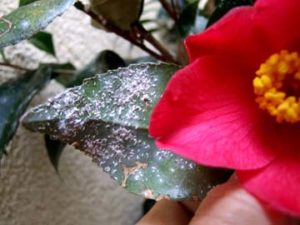 Scale insects suck on the plant to extract plant juices. They extract the nutrients they want, then excrete honey dew which is loaded with plant sugars. This honey dew is what covers the plant’s leaves
Scale insects suck on the plant to extract plant juices. They extract the nutrients they want, then excrete honey dew which is loaded with plant sugars. This honey dew is what covers the plant’s leaves
and is where the sooty mold fungus grows (the black sooty looking residue on the leaves). Aphids feed in the same fashion. Sooty mold, though ugly, does little harm to the plants.
Scale insects come in many forms and, more importantly, two life stages. The adults are usually grouped into hard and soft body scales. Both of these scale types are very difficult to kill because of the protective coating they develop around themselves. The adults usually do not move once they mature and form their protective coating.
A crawler stage hatches from eggs produced by the adults and it is the crawler stage that moves around the plant further spreading the infestation.
One of the most effective treatments for the adult scale is horticultural oil. This is not your old dormant oil. These oils are highly refined and when used correctly have a very low leaf burn potential compared to dormant oil. The adults must be covered completely so the oil can suffocate the insect. We also use systemics to control the scale. Crawlers are much easier to control and we utilize several different contact pesticides to accomplish this.

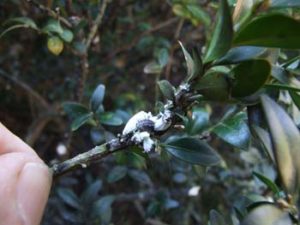
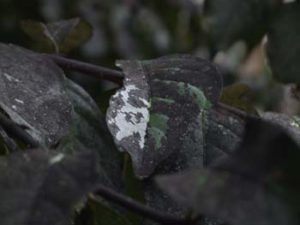 Please note that the simple presence of sooty mold does not necessarily mean your plant has scale or aphids. In many cases trees overhanging your planting may actually be the location of the insect and the honey dew is simply raining down on your landscape plants. The remedy for this is to treat the large overstory tree (very costly though we do provide that service), remove the overstory tree (very costly) or simply hose off the plants under these trees to keep the sooty mold from growing. Sooty mold does not have to be treated as it causes only cosmetic damage.
Please note that the simple presence of sooty mold does not necessarily mean your plant has scale or aphids. In many cases trees overhanging your planting may actually be the location of the insect and the honey dew is simply raining down on your landscape plants. The remedy for this is to treat the large overstory tree (very costly though we do provide that service), remove the overstory tree (very costly) or simply hose off the plants under these trees to keep the sooty mold from growing. Sooty mold does not have to be treated as it causes only cosmetic damage.
Our programs are based on an Integrated Plant Health Management program. We look, inspect, and determine if a pesticide application is needed before we spray. Through our fertilization program we ensure each plant has adequate nutrients for proper growth and development.
A healthy plant can withstand attack by pests much better than a weak plant.
« Back to Glossary Index